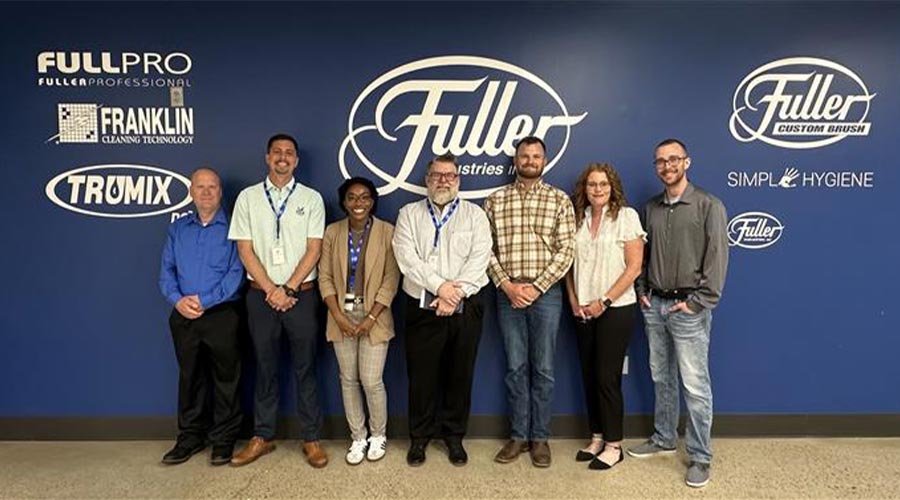
Tariffs, low water levels in the Panama Canal and even sea-faring pirates. When one pictures Fuller Industries Inc. surrounded by miles of wheat fields west of Great Bend, they probably don’t connect it with these high sea hazards. But they are a factor for the legacy commercial cleaning supply maker as it sources raw materials, said Ginny Parsons, Fuller’s procurement specialist.
“People have no idea,” she said. “There are just so many things that are out of your control.”
These all impact costs and how those costs affect pricing for Fuller's global customer base. And, possibly worse, shipping bottlenecks can create production delays and customer service headaches.
That is why it was a huge win when Brenntag, traveled to Great Bend to meet with Fuller and tour its massive facility. Brenntag is a domestic producer of the surfactant that is a key ingredient in hand soaps that reduce the liquid's surface tension, and provides cleaning and sudsing properties.
“This is a big deal for us,” Parsons said. “They requested to meet with us.”
Fuller makes a lot of hand soap. On average, it goes through 44,000 pounds of the surfactant each month, making enough soap to fill 5 million dispensers each year.
“When I’m sourcing these materials, I always try to source locally. We think America first,” she said. “But we have to look at our bottom line and the items from overseas were just so much less expensive.”
That is, until world economics, geopolitics and piracy hit close to home. “Now, that is becoming less of an issue,” she said.
Costs are starting to level out and looking to an American supplier lessens supply chain woes.
A better option
Currently, surfactants come into Fuller in 250-gallon plastic totes. Often, the viscosity, or thickness, of the liquid contents is like that of maple syrup, Parsons said.
First, the material is super concentrated and if it is cold, it gets even thicker. This means the totes have to be placed in giant ovens and warmed so it thins and will flow through the hoses on the production lines.
“This all takes time and affects production time and labor costs,” Parsons said. “But, with the lower cost, we could justify this.”
Brenntag is a backup vendor for Fuller now, providing the product if there are problems with other sources. But, it also offers an option that arrives ready to run smoothly.
"Finding better ways to store raw materials and compound our finished goods is where we rely on our partners like Brenntag,” she said.

 Celebrating BSCAI's 60th Anniversary eBook
Celebrating BSCAI's 60th Anniversary eBook The Down and Dirty on Cleaning in Virus Season
The Down and Dirty on Cleaning in Virus Season How Surfactant Use is Expanding in Commercial Cleaning
How Surfactant Use is Expanding in Commercial Cleaning